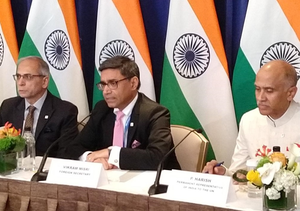New York: During a whirlwind trip of about 55 hours, Prime Minister Narendra Modi achieved “very significant outcomes” in bilateral and multilateral domains and India was able to share its thoughts on a global stage, according to India’s Foreign Secretary Vikram Misri.
“I’m sure the results from this will stand us in good strength as we move forward,” Misri said briefing reporters on Prime Minister Modi’s visit that included meetings with US President Joe Biden and other leaders, participation in the Quad and United Nations summits, and speaking at a rally of the diaspora.
Despite being brief, “We’ve had very significant outcomes in the bilateral, in the unilateral and in the multilateral domains”, he said. It has “enabled India to say its piece and share its thoughts on a global stage”.
The visit had “a very strong technology element”, not only with the roundtable of tech CEOs, but also in the joint statement of the Quad, the US-India bilateral factsheet, and Prime Minister Modi’s other settings, he said.
The tech CEOs roundtable felt at this moment when things like AI and quantum computing are changing the world as we know it, the belief in India that “technology can be a driver of seminal change for the nation, but also for countries of the global south in general, which should not be left behind in this race for technology”. “They felt that India could play a leadership role in this regard,” he said.
The concept of the digital public infrastructure (DPI) that provides for a payments, identity, and documentation system that India had rolled has “shown a third way to the world of how digital prowess could be leveraged for social and public good, not just in one country, but in a scalable manner to the rest of the world”, he said
“It also gave the opportunity to reflect on how technology has become a core driver of the India-US strategic partnership,” he added.
The CEOs of major tech companies like Google, Nvidia, Global Foundry and IBM, as well as bioscience giants like Moderna and Biogen, participated in the roundtable.
The joint fact sheet released by the White House said President Biden and Prime Minister Modi agreed to drive new AI innovation opportunities, enhance R&D collaboration on advanced semiconductor processors, and increase support for India’s National Quantum Mission.
Asked about the effect on India-US relations from the reported meeting between Khalistani Sikhs and White House officials, and the cases filed against the Indian government and some officials by Khalistani leader Gurpatwant Singh Pannun, Misri said, “We are quite clear in so far as the big story here is concerned, which is the very important, relationship between India and the United States, we intend to keep working on that.”
Dismissing the attempts to introduce irritants, he said, “If you want details with regard to that and what the motivation of these things is, what the purpose is, and what ends this is supposed to serve, I think it would be better to direct this question to people who are directly involved in this.”
India had abstained on last week’s General Assembly resolution backing the World Court ruling that Israel’s occupation of the West Bank and Gaza Strip was illegal and demanding its withdrawal from there.
Asked if it had figured in Prime Minister Modi’s meeting with Palestine President Mahmoud Abbas, Misri said that the Palestinian leader “did explicitly state that he was very appreciative of India’s support, not just for humanitarian assistance, but also for India’s political support to Palestine on the international stage”.
The Summit of the Future adopted a Pact for the Future committing the world leaders to an action plan to meet the challenges facing the world and the UN and it called for speeding up the Security Council reform process.
Misri said that it was significant that “for the first time, a UN summit document has a detailed paragraph on UN Security Council reform”.
“So it may not have every single detail in every area that we would imagine or we would like there to be, but I think it’s a good beginning, and we look forward eventually to the beginning of text-based negotiations in a fixed time frame going forward,” he added.
–IANS


Comments are closed.